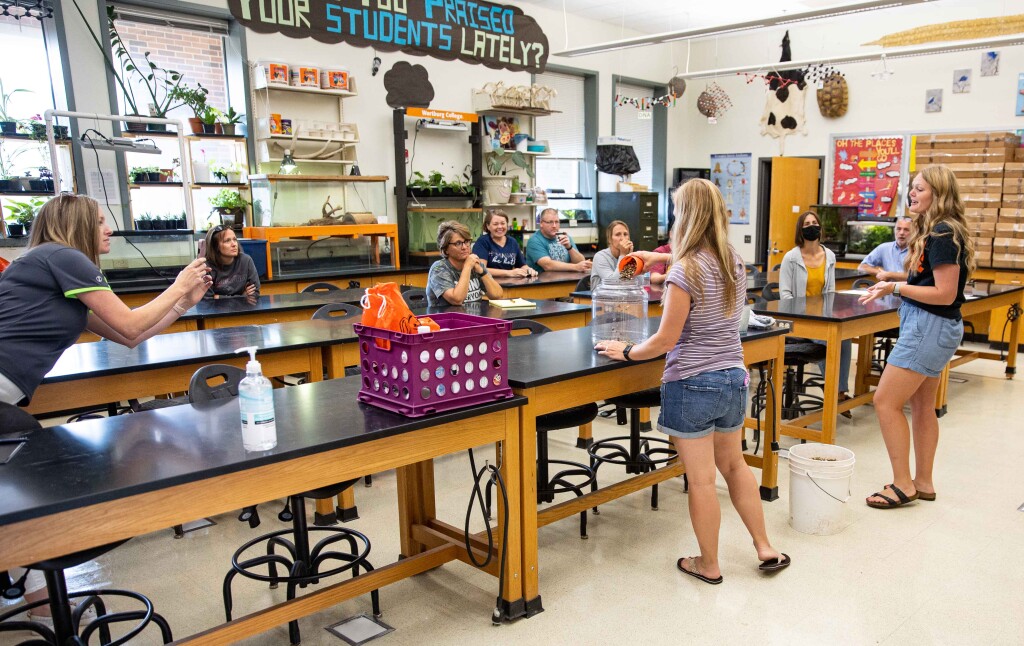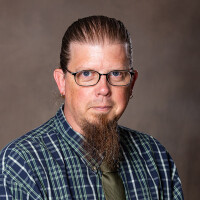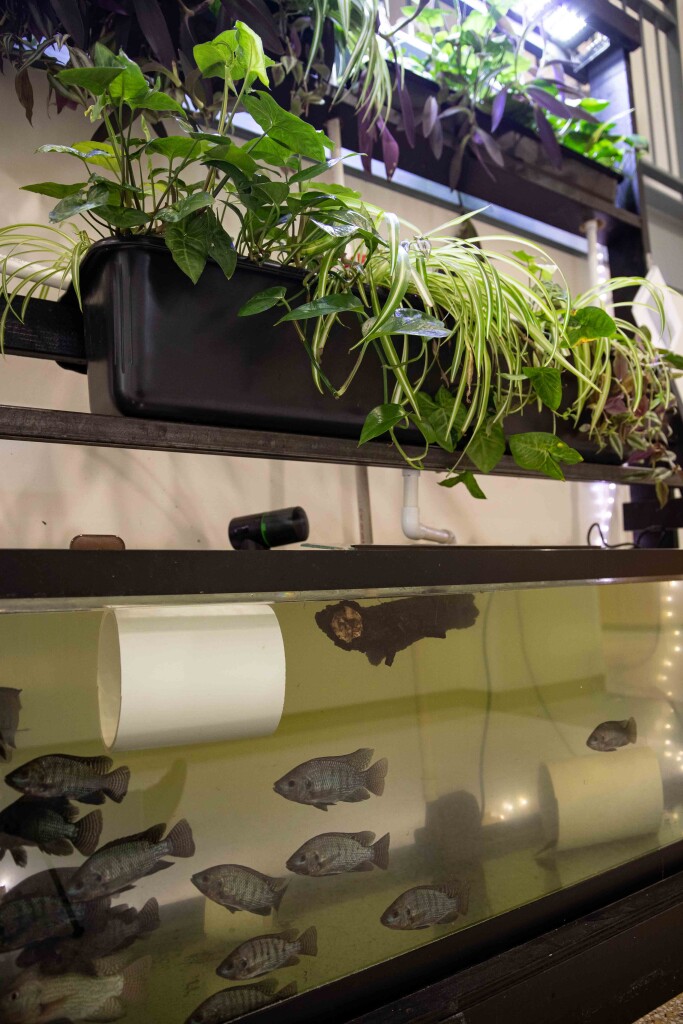Small Fish in a Big Pond
March 9, 2022

Wartburg professor’s micro-ecosystem competes with Lego, Project Lead the Way as part of statewide STEM Scale-up Program
By Emily Christensen | Photos Julie Pagel Drewes ’90
Paul Mugan ’90 couldn’t wait to teach his freshman ecology class at Waverly-Shell Rock High School this winter. After using online simulators and textbook lessons, Mugan now has a hands-on teaching tool that mimics a micro-ecosystem thanks to the genius of fellow Knight Dr. Michael Bechtel ’94 and the generosity of the 2021-22 Iowa STEM Scale-up Program.
In 2021, Bechtel’s Ioponics (Iowa + aquaponics) system was selected by the Iowa Governor’s STEM Advisory Council to be shared with educators of all types throughout the state. The educational system combines aquaculture (raising fish) and hydroponics (growing plants without soil) in an integrated system using aerobic bacteria that transforms fish waste into nutrients for plants. Mugan’s classroom setup is now one of about 130 of the 40-gallon systems placed around Iowa through the grant program. Another 50 three-gallon microsystems also were distributed. Because of the initial success, Ioponics was once again chosen as a Scale-up Program option for the 2022-23 year.
Bechtel, associate professor of science education at Wartburg, used his sabbatical during the 2021 Winter Term to plan for the project. During the summer, he worked with Eric Berns, the college’s biology laboratory coordinator; Ruth Hein, Science Center office coordinator; and several students to prepare the pieces needed for each system. The old Players Theatre served as a holding area for the painted wood, plastic growing bins, and 40-gallon fish tanks. Then, during early August, Bechtel and his students headed out across the state with truckloads of equipment and a professional development program that gave educators of all types a crash course in aquaponics.
“The Iowa STEM Scale-up Program provided the springboard to get Ioponics underway. We were selected alongside businesses like Lego, Project Lead the Way, and Dreambox,” said Bechtel. “The 2021-22 year was a steep learning curve, and COVID added a lot of turbulence that I was not expecting with increased wood prices, exponential shipping costs and delays, business closings, longer manufacturing timelines, and searching for materials. Having said that, I am ready for what comes next.”
For high school teachers like Mugan, the Ioponics system, which comes with standards-aligned lesson plans for all ages and additional academic and system supports, offers a convenient, hands-on project his students can monitor over time. And when they aren’t using it, the system nearly takes care of itself. Mugan also collected one-gallon containers that his students can use to set up their own habitats and then simulate different disasters to see how the plants and fish react.
“We can do a manure spill, an oil spill, basically put anything in there that shouldn’t be there and see what happens,” he said. “In the past I’ve been able to use a website that mimics these reactions, but to see it in real time will be so much more engaging for the students.”
Bechtel has been using aquaponics systems in his own classrooms for years, but it wasn’t until his students began asking about them that he began to think about ways of sharing the learning opportunity with others. Ryan Henkel ’17, a religion major who went on to earn his Master of Divinity at Trinity School for Ministry in Ambridge, Pennsylvania, was Bechtel’s “original Ioponics student.” Henkel knew a little about aquaponics and talked to Bechtel about how they could work together to create a setup that would provide a sustainable food source to people in food deserts, areas with limited access to affordable fresh foods.
“This isn’t just about being in education or biology or science. Anyone can be a part of this work and giving back to the community,” said Henkel, who recently set up a 75-gallon system in the church where he serves in Emmons, Minnesota. His hope is that within a couple of months he can begin growing leafy green vegetables and then tomatoes, strawberries, and other fruits and vegetables. Once the system begins producing, the fresh food will be turned over to the local food pantry. His goal is to get other churches involved so more food can be produced and donated. “This is something that people can see tangible results from, and it connects with the college’s four pillars. It’s something that everyone can do within their community, whether it’s in a library or a civic-related building, a public service office, a church, or their own backyard.”
After Henkel graduated, Bechtel continued with the project and began looking at ways to get it into more hands. As a science education professor, the obvious route was through schools and other organizations that engaged with young people.

“The whole idea of educational aquaponics — where it started and where it’s growing — is amazing. I am super excited about the interest it has drawn statewide and nationally,” Bechtel said. “I am very surprised about who has contacted me and what groups have shown interest in both purchasing and assisting. Dr. (Allan) Bernard (associate professor of business administration) had stated this endeavor had the possibility to get large. I guess I should have believed him.”
In addition to the systems in Iowa, Bechtel has Ioponics setups in 11 states, including Alaska, Arizona, Florida, and North Carolina. Throughout the process, Bechtel has engaged students in the business and engineering departments, but he relies most heavily on his science education students for support. During the summer of 2021, Sidney Baumgartner ’22 and Becca Montgomery ’22 led professional development sessions for teachers around the state, and his next crew of pre-service teachers is ready to take the reins when those two graduate in May.
“I get very excited about watching Wartburg students become engaged. To think that the whole thing started with an after-class discussion with a religion major,” Bechtel said.
For Bechtel, an eternal optimist, the possibilities for Ioponics are limitless.
“I have no real expectations, but I do have some ideas. I would like to get a system in all 50 states. This idea is getting closer because we are trying to build and place Ioponics systems through a Wartburg College service project in four southwestern states this spring,” he said. “I would love to get involved with Curriculum for Agriculture Science Education and other state education agencies. I am hoping to create partnerships with businesses that focus on urban agriculture, microfarming, and/or self-sufficiency. I hope we keep expanding into residences, businesses, and storefronts … beyond the school buildings. There seems to be no end.”

